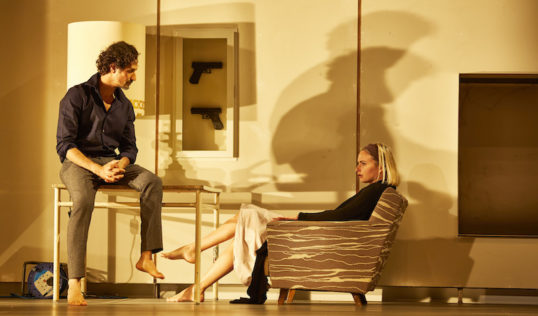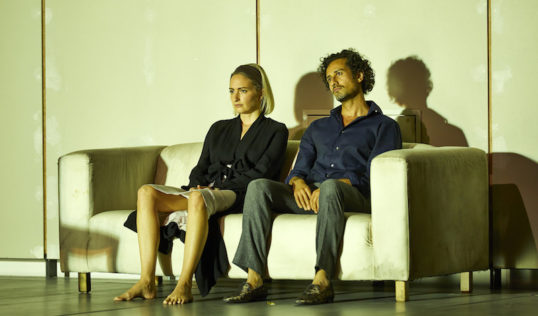Hedda Gabler
★★★★☆ Modern
Festival Theatre: Tue 17 – Sat 21 October
Review by Thom Dibdin
Stark and tense, Ivo van Hove’s production of Hedda Gabler for the English National Theatre and touring to the Festival Theatre all week, is a thoroughly unnerving reading of Ibsen’s great play.
The text is a new version by Patrick Marber, which brings out the modernity of the original with a streamlined approach to the language. It also emphasises the destructive power of Hedda, lost in a marriage she took up on a whim and doesn’t want to be in.
Van Hove’s direction is a technical delight – he has the whole production steaming along at great speed, each character deliberately placed on the stage to serve that pace. Yet he leaves it almost static at times, the actors sat numbly mouthing their lines, showing far more than any emotion how their distracted characters have no real interest in each other.
This is of course Hedda’s play – it’s her maiden name not her married name which carries the title. Yet van Hove never emphasises the link to her military father that some productions do, except as a reason for her two pistols to be placed in a box, framed against the rear of the sparse set of an otherwise unadorned room, not yet decorated or furnished.
Lizzy Watts’s Hedda has energy and nerves of steel. Married to the academic Tesman they are newly returned from honeymoon to the house which she always wanted, or so she said, and which he can barely afford.
The extravagance is just one example of her cutting, hurtful ways. Mostly, though, she deals in manipulation, using it to wilfully destroy all around her. Each destruction is an act of self harm, designed to confirm her own existence, until she over-reaches and becomes the subject of manipulation herself.
real humanity
Watts’s Hedda has the brutal candour of the sadistic, but also a real humanity. And for all her viciousness and distancing, you can’t help but sympathise as all around her objectify her. Not least Abhin Galeya’s Tesman talking about her with his aunt, Juliana (Christine Kavanagh), in front of her, discussing her physique filling out as if she might be pregnant.
Geleya is a dynamic presence as Tesman – weak willed in comparison to his new wife, but hardly the spent force which some have played him as. It is just that he is already, as the play opens, a trophy in Hedda’s cabinet and as a consequence, to be regarded with little more than disdain, if regarded at all.
The visiting Mrs Elvsted – who has left her husband for Tesman’s rival academic Lovborg and knew Hedda at school – is given a similar amount of spine by Annabel Bates. Again, although considerably in Hedda’s contempt, she is not a weak character, just one who, despite leaving her husband, is too socially conforming for Hedda to contemplate.
It is that conformity which Hedda has a pathological hatred for. And in her undoing of Richard Pyros’s equally self-destructive Lovoborg – feeding him alcohol, burning his manuscript and giving him the means with which to commit suicide – she seems to be doing to him what she wants to do to herself.
Indeed, her whole trajectory is one of self-destruction – from taking up with Tesman on. And in her toying with the Judge Brack, given a vile arrogance by Adam Best which resonates more than ever this week in the shadow of the Weinstein revelations, she is playing with one who is bent on eating out the heart of society from the inside.
Staged in a set which contains no doors – everyone entering the stage does so from the auditorium – the only other constant presence on stage is of Madlena Nedeva’s Berte, the maid.
Black-clad and equally dark in her delivery, Berte is both a jailor and a facilitator of Hedda’s darkest acts. Yet in van Hove’s scheme it feels that she is neither (or both), but a representation of women’s role in the society from which Hedda is attempting to escape.
It is an unsettling, confrontational reading of the play. One which, with Hedda’s slinky figure-hugging slip dress and in her power-relationship with Brack, feels uncomfortable coming, as it does, from the male gaze. Yet, it is this which makes it such a thoroughly contemporary, if flawed, production.
Running time: Two hours and 20 minutes (including one interval)
Festival Theatre, 13/29 Nicolson Street EH8 9FT.
Tuesday 17 – Saturday 20 October.
Evenings: 7.30pm; Matinees Thurs & Sat: 2.30pm.
Tickets and Details: www.edtheatres.com/hedda.
Tour website: https://www.nationaltheatre.org.uk/shows/hedda-gabler-on-tour
Twitter: @heddagablertour
Facebook: /heddagablertour
Patrick Marber’s version of the script – for Kindle and in paperback – is available from Amazon. Click images for details:
| Hedda Gabler on tour: | |||
|---|---|---|---|
| Tue 17 – Sat 21 Oct 2017 | Edinburgh Festival Theatre |
0131 529 6000 | Book online |
| Mon 23 – Sat 28 Oct 2017 | Leicester Curve Theatre |
01162 423 595 | Book online |
| Tue 31 Oct – Sat 4 Nov 2017 | Salford Lowry Theatre |
08432 086000 | Book online |
| Tue 7 – Sat 11 Nov 2017 | Norwich Theatre Royal |
01603 63 00 00 | Book online |
| Mon 13 – Sat 18 Nov 2017 | Hull New Theatre |
01482 300 300 | Book online |
| Tue 21 – Sat 25 Nov 2017 | Aberdeen His Majesty’s Theatre |
01224 641122 | Book online |
| Tue 28 Nov – Sat 2 Dec 2017 | Northampton Royal & Derngate |
01604 624 811 | Book online |
| Mon 15 – Sat 20 Jan 2018 | Glasgow Theatre Royal |
0844 871 7647 | Book online |
| Tue 23 – Sat 27 Jan 2018 | Wolverhampton Grand Theatre |
01902 429212 | Book online |
| Mon 29 Jan – Sat 3 Feb 2018 | Woking New Victoria |
0844 871 7645 | Book online |
| Mon 5 – Sat 10 Feb 2018 | Nottingham Theatre Royal |
0115 989 5555 | Book online |
| Tue 13 – Sat 17 Feb 2018 | Newcastle Theatre Royal |
08448 11 21 21 | Book online |
| Tue 20 – Sat 24 Feb 2018 | York The Grand Opera House |
08448 472 322 | Book online |
| Tue 27 Feb – Sat 3 March 2018 | Milton Keynes Milton Keynes Theatre |
08448 717652 | Book online |
| Tue 6 – Sat 10 March 2018 | Dublin Gaiety Theatre |
0818 719388 | Book online |
ENDS





















